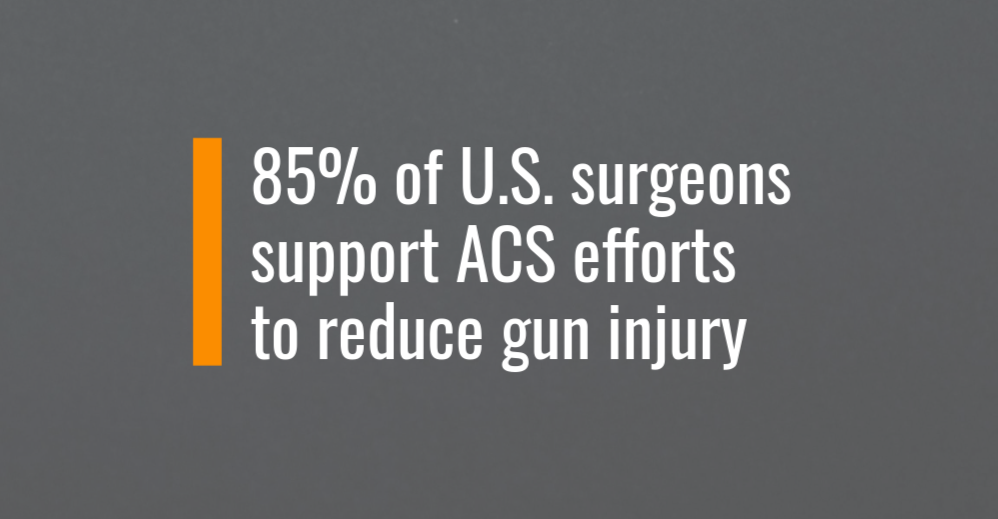According to a new survey, a substantial majority of U.S. members of the American College of Surgeons (ACS) support the organization taking an active role in advocating for policies and programs designed to lower the risk of firearm-related injuries and deaths. The initiatives they support include preventing people with serious mental illness from buying firearms and cracking down on illegal firearms sales.
The survey also examined gun ownership among surgeons and their gun storage practices. Results showed that 42% of ACS members keep firearms in their homes and 32% of surgeon firearm owners store firearms unlocked and loaded.
The survey was sent to nearly 55,000 ACS members in the United States, and more than 11,000 responded. Results of the survey have been published in two articles on the website of the Journal of the American College of Surgeons (JACS) in advance of print.
Broad support for most initiatives
The first article reports broad support among members, ranging from medical students to retired surgeons, for a number of initiatives to reduce firearm injuries.
More than 60% of surveyed members said they treat firearms injuries, and almost three-quarters “support the ACS being right at the frontline of solving this issue,” said lead study author Deborah A. Kuhls, MD, FACS, interim assistant dean for research and professor of surgery at the Kirk Kerkorian School of Medicine at the University of Nevada Las Vegas.
Respondents were asked to rate their support on a scale of 1 to 5 for 25 possible advocacy/policy initiatives. Receiving the highest scores (4.4 or higher) were:
- Preventing people with mental illness from purchasing firearms
- Increasing penalties for dealers who sell guns illegally or bypass background checks
- Increasing penalties for straw purchasers (people who give guns to others illegally)
- Enhancing the National Instant Criminal Background Check System (NICS)
- Using NICS for mandatory background for all gun purchases from authorized dealers
Sixteen suggested initiatives carried a score of 4 or above, which was considered very important. But there wasn’t such strong consensus on the other nine initiatives, such as increasing interstate reciprocity on concealed carry permits and allowing teachers to carry concealed weapons in schools. Nor was there strong consensus on limiting firearm ownership to people age 21 and over.
“The results were really overwhelmingly in support that the ACS should play a role in decreasing firearm injuries and deaths,” Dr. Kuhls said. “There was broad support that this is a public health problem and that the ACS should be leading and joining other organizations in addressing this very unfortunate cause of injuries and death in the United States.”
Large percentage of surgeons own guns
The second article reports survey data on the subset of ACS members who own firearms (42%), their reasons for firearm ownership, and how they store their guns and ammunition.
Among ACS members who own firearms:
- 39% store their household firearms unlocked
- 32% store their firearms unlocked and loaded
- 82% own long guns
- 82% own handguns
- 32% own high-capacity, magazine-fed, semi-automatic rifles
Among ACS members who own firearms, 75% say they own a gun for self-defense and 73% for target practice.
Reasons for gun ownership varied by gender. Women were more likely to own a gun for self-defense, while men were more likely to do so for target shooting and hunting. Urban respondents were more likely to own handguns; rural respondents more likely to own long guns. Among gun owners, 19% said they had taken a concealed carry course.
While 42% of ACS members keep firearms in their home, nearly two-thirds (63%) of ACS members have had some type of firearm training.
Speaking with unified voice
“The objective of this study was not to say firearms are good, firearms are bad, or this is exactly what the ACS should do, but rather to understand clearly what ACS members think can and should be done to make firearm ownership as safe as possible,” said Brendan T. Campbell, MD, MPH, FACS, lead author of the study on firearm storage habits and a pediatric surgeon at Connecticut Children’s in Hartford.
“What’s really important about the work that came out of this survey is that it provided data that speak for most of the membership of the ACS,” Dr. Campbell added. “It really helps the ACS speak with a unified voice on this sometimes contentious issue.”

